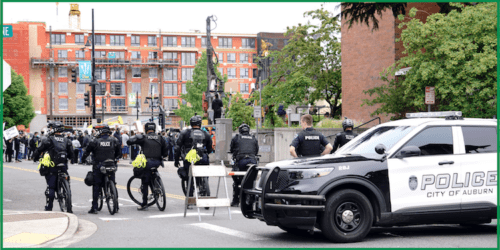It’s crucial to have detailed safety guidance to help survive road rage incidents, which unfortunately have become more common on our highways and streets.
When stress, frustration, and impatience reach high levels, they can lead to dangerous and aggressive behavior. This behavior can put drivers, passengers, and pedestrians at risk.
However, by fostering a road safety culture and adopting preventive measures, we can mitigate road rage incidents and create a safer environment for everyone.
This article will teach practical and effective safety tips and techniques to avoid road rage incidents and maintain a safe driving environment. The strategies provided will help you prevent road rage and ensure a peaceful commute for yourself and other drivers.
Table of Contents
- Road Rage Causes and Triggers
- Practicing Individual Self-Control
- Promoting Empathy and Respect
- Utilizing De-Escalation Techniques
- Exercising Defensive Driving
- Alternative Transportation Systems
1) Road Rage Causes and Triggers:
To address it effectively, we must comprehend road rage’s underlying causes and triggers. Stress, traffic congestion, personal frustrations, and a sense of anonymity within the confines of a vehicle can contribute to aggressive behavior on the road. By recognizing these triggers, individuals can actively work towards managing their emotions and promoting a calmer driving environment.
2) Practicing Individual Self-Control:
Maintaining self-control is critical to preventing road rage. It’s vital to avoid engaging in aggressive or retaliatory behaviors. Instead, focus on maintaining composure, allowing extra time for your journey, and refraining from unnecessary confrontations. Take deep breaths, listen to soothing music, or engage in relaxation techniques to keep stress levels in check while driving.
3) Promoting Empathy and Respect:
Remember that everyone on the road has their destination, challenges, and stresses. Practicing empathy and respecting other drivers’ space and time can go a long way in preventing road rage incidents. Avoid tailgating, using offensive gestures, or honking unnecessarily. A courteous and patient approach can defuse potential conflicts and contribute to a safer road environment.
4) Utilizing De-Escalation Techniques:
It’s essential to recognize that some situations may be beyond your control. Instead of escalating a potential conflict, focus on de-escalation techniques. Avoid making eye contact with aggressive drivers, refrain from engaging in arguments, and resist the temptation to retaliate. Reporting aggressive behavior to the appropriate authorities can help ensure the safety of all road users.
5) Exercising Defensive Driving:
Adopting defensive driving techniques can significantly reduce the likelihood of road rage incidents. Maintain a safe following distance, adhere to speed limits, use turn signals, and avoid sudden lane changes. Anticipate the actions of other drivers and remain vigilant about potential hazards. By prioritizing safety, you contribute to a more harmonious driving experience.
6) Alternative Transportation Systems:
Consider alternative transportation options when road rage seems inevitable due to external factors like heavy traffic or construction activities. Public transportation, carpooling, or choosing less congested routes can relieve stress and reduce the chances of encountering road rage situations.
Bottomline
Road rage prevention and safety require a collective effort from all road users. Understanding the causes of road rage, practicing self-control, promoting empathy and respect, and adopting defensive driving techniques can create a safer and more pleasant commuting experience.
Remember, a calm and composed attitude protects yourself and others and contributes to a positive driving culture. Let’s strive for peaceful roadways and make our journeys safer for everyone.
Do you enjoy this reading? Kindly share with family, friends, and colleagues. Thanks! 🙂



